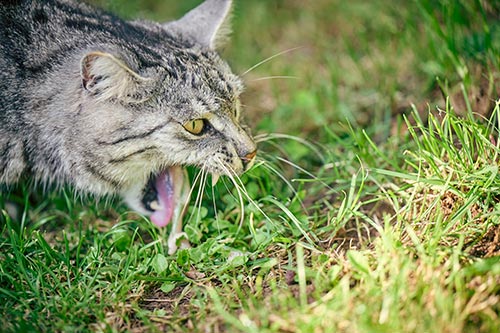Vomiting is a common issue many cat owners encounter, but it can be concerning when it happens frequently. While occasional vomiting may not be a major cause for alarm, repeated episodes can indicate an underlying problem. Understanding why your cat is vomiting and what steps to take can help you know when to seek professional care. At Creekside Pet Care Center, we are here to help you identify the causes of vomiting in your cat and offer the most effective treatment options. For more information or to schedule an appointment, call us at (817) 421-5850.
Why Do Cats Vomit?
Cats vomit for various reasons, some more serious than others. A single instance of vomiting might occur because your cat ate too quickly, had a hairball, or reacted to something they shouldn’t have eaten. These situations are usually not worrisome. However, vomiting can also be linked to more concerning conditions, such as gastrointestinal issues, infections, or even organ dysfunction.
Vomiting can be a way for a cat to remove something irritating from their digestive system. This could include indigestible items, toxins, or spoiled food. Sometimes, it is difficult to tell whether your cat is vomiting because of something minor or if it’s due to a more serious problem that needs a vet’s attention. When in doubt, it’s always best to err on the side of caution and give us a call.
Common Causes of Vomiting in Cats
There are many possible causes of vomiting in cats. Some are mild and easily treatable, while others may require more in-depth care. Below are some of the most frequent reasons cats vomit:
- Hairballs: Cats groom themselves regularly, and in doing so, they often swallow hair. Most of the time, this hair passes through their digestive system without issue. However, some cats will form hairballs, which can lead to vomiting.
- Dietary Changes or Food Sensitivities: A sudden change in diet can upset your cat’s stomach, leading to vomiting. Cats can also have food sensitivities or allergies that cause gastrointestinal distress. If your cat has been vomiting more than usual, think about any recent changes in their food or treats.
- Eating Too Fast: Cats that eat too quickly may regurgitate their food shortly after meals. This type of vomiting is usually due to overeating or gulping down food too fast. Slowing down their eating with a special feeder can help reduce this problem.
- Ingesting Foreign Objects: Cats are curious creatures and may swallow items that don’t belong in their system, such as strings, toys, or plants. These foreign objects can block the intestines, leading to vomiting. If you suspect your cat has swallowed something dangerous, contact Creekside Pet Care Center right away.
- Infections or Parasites: Bacterial, viral, or parasitic infections can irritate your cat’s stomach, causing vomiting. Intestinal parasites, such as worms, are a common cause of vomiting in cats, especially in kittens. A veterinarian can check for these issues and provide treatment.
- Chronic Conditions: Long-term illnesses, such as kidney disease, liver disease, or inflammatory bowel disease (IBD), can also cause chronic vomiting. If your cat has a medical condition that affects their digestive or urinary system, vomiting could be a sign that their disease is worsening or progressing.
When to Be Concerned About Your Cat’s Vomiting
Occasional vomiting in cats may not always be a reason for immediate concern. However, it’s important to know when vomiting signals a bigger issue. If your cat vomits multiple times in one day or for more than a few days in a row, they may need to be seen by a veterinarian. Additionally, if vomiting is accompanied by other symptoms like lethargy, loss of appetite, diarrhea, or weight loss, it could be a sign of a more serious underlying condition.
Dehydration is another risk that comes with frequent vomiting. Cats who vomit repeatedly can quickly lose fluids, which can make them weak and ill. If your cat refuses to drink water or appears dehydrated, contact us at Creekside Pet Care Center as soon as possible.
Treatment Options for Vomiting in Cats
The treatment for vomiting depends on the underlying cause. At Creekside Pet Care Center, our goal is to find the root cause of your cat’s vomiting and provide appropriate care. Below are some common treatment approaches:
- Diet Adjustments: If we determine that your cat’s vomiting is due to food sensitivities or a recent change in diet, we may recommend switching to a different type of food. Sometimes, a diet that is easier on the stomach, such as one with limited ingredients or a prescription diet, can resolve vomiting issues.
- Medication: For cats with infections, parasites, or gastrointestinal inflammation, medication can help. Antibiotics, antiparasitic drugs, or anti-inflammatory medications may be used depending on your cat’s diagnosis.
- Fluids and Supportive Care: If your cat is dehydrated from vomiting, fluid therapy may be necessary to restore their hydration levels. In severe cases, hospitalization and intravenous fluids may be required to help your cat recover.
- Diagnostic Tests: To get to the bottom of your cat’s vomiting, we may suggest diagnostic tests, such as bloodwork, X-rays, or ultrasounds. These tests help us rule out more serious conditions, such as blockages, organ disease, or tumors.
- Surgical Intervention: If your cat has swallowed a foreign object that is causing a blockage, surgery may be needed to remove it. Our team is equipped to handle these situations and ensure your cat receives the care they need.
Preventing Vomiting in Cats
While not all vomiting can be prevented, there are steps you can take to reduce the chances of your cat experiencing gastrointestinal distress. Feeding your cat a consistent, high-quality diet and avoiding sudden changes in food can help prevent digestive upset. Also, keeping hazardous items out of your cat’s reach can minimize the risk of them swallowing foreign objects.
Cats prone to hairballs may benefit from regular grooming and hairball control foods. Slowing down fast eaters with puzzle feeders or portion-controlled meals can also prevent vomiting due to overeating.
It’s important to stay aware of your cat’s behavior and habits. If you notice any changes, such as vomiting more frequently or acting differently, it’s always a good idea to have them checked by a vet.
Call Creekside Pet Care Center for Help
Vomiting can be a sign of many different issues in cats, some minor and others more serious. If your cat is vomiting frequently or showing other symptoms, we encourage you to give us a call at Creekside Pet Care Center at (817) 421-5850. We can help you figure out what’s causing your cat’s vomiting and recommend the best course of action. Whether it’s a dietary adjustment, treatment for an infection, or further diagnostic testing, our team is here to support you and your cat every step of the way.






